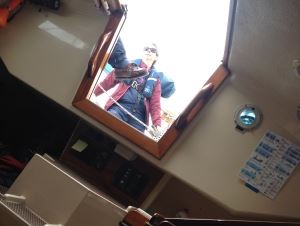Steve Baxter's Blog
A funny thing happened…
A short anecdote and message about not trying too hard...
A funny thing happened to me this weekend. I took an early afternoon nap on a nice comfy bunk and woke up on the wall.
My wife and I have a love of sailing, particularily with our friends in their cosy yacht. There is something very relaxing about coasting along under sail with only the sound of the wind and the water as accompaniment.
Yet there is a competitve streak that is, if you excuse the pun, always lurking just beneath the surface. Occasionally we like to see just how fast we can go.
Generally this happens as follows: We can be quite happily coasting along then another yacht will come into view behind us. Catching up with us. How dare they! At this point our leisurely cruise turns into a race. No words need to be spoken, a slight narrowing of the eyes perhaps. Sails are adjusted, topes tightened and course fine tuned. The other yacht’s crew may not even be aware that we are now racing.
But we are.
Yacht 101

Yachts sail by the action of the wind passing over the sails which are formed by careful arrangement of rigging into a wing-like aerofoil shape. This can create enormous force and the yacht is prevented from simply being blown sideways by the weighty keel attached to its hull, a large blade digging into the water below the boat.
The wind force causes the yacht to heel over, lean over away from the wind at what can seem an alarming angle. Thus I woke to find my wife on the helm trying to eek an extra knot out of the boat and the world at an angle of 45 degrees. Naturally my first instinct was to take a photo...
The Lesson
I recalled a sailing holiday many years ago, where some holiday flotilla company allowed me to hire a rather valuable 34 foot yacht on the dubious basis that I had a certificate for sailing a 8 foot dingy in a circle. Bit like letting someone drive a Ferrari because they once drove a pedal car. Fortunately I turned out to be a quick learner and was soon racing other 8 boats in the flotilla as we sailed to that night’s mooring. After a few days of this, the flotilla captain on the holiday company boat decided we were ready and challenged us all to a race.
Naturally, like every other boat in the flotilla I hoisted every bit of sail, all aligned and pulled super-taught by ropes winches tightened until they squealed. We set off, gallantly granted a head start, surging through the water, heeled over, spray breaking over the bow, crew hanging off the uphill side of the boat to add extra counterbalance against the heeling forces.
Sometime later the fleet skipper set off, just a single sail raised, halfway up the mast. His yacht sailed flat on the water, no great plumes of spray, no excitement. Surely he wasn’t taking this seriously? We checked his boat with binoculars for any sign of tell-tall exhaust cooling water to make sure he hadn’t done the dirty and put the engine on! Nope, he was sailing, whilst drinking a cup of coffee.
How did he do it?
Imagine our ire and disbelief as he caught and casually, calmly passed all the other boats and ours. He beat us easily but it was worth being beaten to learn one thing – how did he go fasten that our rigged up, heeled over speed machines?
The answer was simple – we had tried too hard. Yachts (at least these non-racing yachts in our in-expert hands) sail more efficiently when flat on the water. There is less contact between yacht and water and less stress on steering, rigging, The vessel has less drag, is easier to control, and goes faster.
Coué’s Law
So why the story about sailing?
I often mention the work of Émile Coué to my clients and students, the famous French psychologist and psychotherapist who is most noted introducing the use of positive affirmations, such as his ‘Every day in every way I’m getting better and better’. But the idea of his that I find most interesting is what he called his principle of 'reversed effort' or what I often refer to as the effort error.
Put simply, this is about putting so much effort or focus into something that you actually sabotage your efforts. Kind of mentally putting all your sails up, putting yourself under pressure to perform rather than adopting an attitute of gentle persistence and calm acceptance of any setbacks.
A significant portion of my therapy clients have a problem with an emotion – typically one of anxiety, worry, fear or anger. All emotions that demand our focus and attention. I recall a client with a fear of flying who was unable to maintain a simple conversation in the departure lounge as his mind was just too busy being anxious. Do you think that his focus and mental effort was helping his anxiety or fuelling it? Do you think that really focussing on battling that anxiety would be helpful?
Focus and attention seems to feed both wanted and unwanted emotions, even efforts to not worry, to not get anxious, etc seem to backfire and contribute to the feelings. You can't do a don't after all.
Perhaps we should move our focus, deliberately occupy our minds with something else that absorbs us. Do something else mentally to evade rather than participate the emotions. Just an idea I had whilst sailing once...